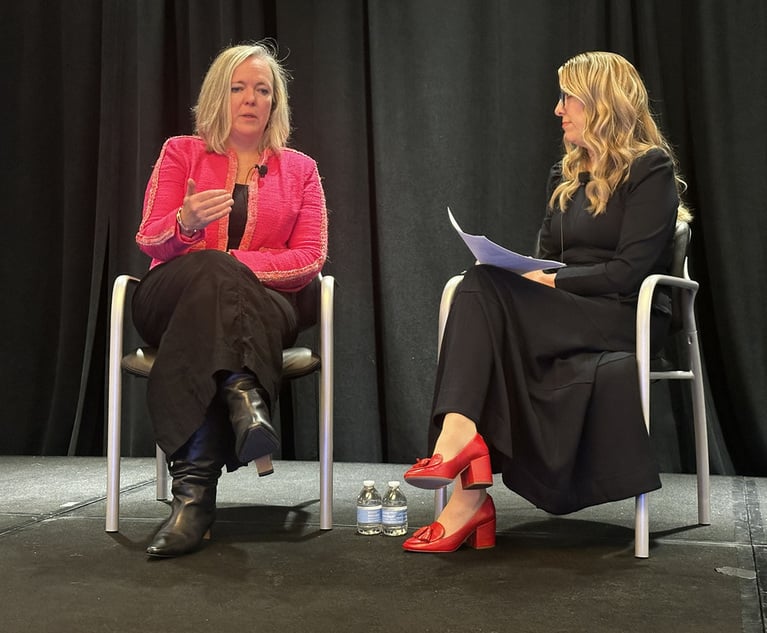COVID-19 Has Shut Down Lots of Things—But Not Privacy Regulators
As cyber criminals continue to exploit COVID-19 anxiety and capitalize on the move to remote work, regulators may be paying more attention than ever to the need for privacy law enforcement actions.
May 06, 2020 at 11:30 AM
4 minute read
The original version of this story was published on Legal Tech News

The aftermath of COVID-19 may change the way attorneys and other legal professionals think about or execute their work, but the privacy landscape could remain largely untouched. While obligations under the Health Insurance Portability and Accountability Act have been temporarily relaxed to facilitate the public's access to telemedicine, the enforcement of other privacy laws seems likely to remain in full force.
For example, Xavier Becerra, the attorney general of California, sent out a press release in April reminding consumers that they could still take advantage of California Consumer Privacy Act tenants—such as the right to be forgotten—during the pandemic. Other regulators may continue to be just as vigilant.
"I'm not seeing large sweeping changes or [regulators] willing to make large sweeping changes just yet. … If anything I'm seeing more enforcement actually," said Christopher Ballod, a partner with Lewis Brisbois Bisgaard & Smith.
Why the increased activity? Ballod has noticed an uptick in the number of incident response cases his firm has walking through the door, the result of bad actors who are successfully leveraging COVID-19-themed phishing emails to get more people to click on contaminated links. He posited that regulators may be aware that the present environment calls for them to be more vigilant—or remote working could just be doing wonders for their productivity.
"It could be that the office environments are less productive for them, which is true for some businesses," Ballod said.
Law firms aren't the only ones tracking how COVID-19 is impacting privacy enforcement. Hilary Wandall, senior vice president of privacy intelligence and general counsel at privacy compliance tech company TrustArc, said corporate clients have been looking for guidance around how to align various elements of their COVID-19 response—notifying employees that someone from the office has tested positive for the virus, for instance—with existing privacy laws.
Some regulators appear eager to comply. In March, for example, the European Data Protection Board published guidance clarifying that the General Data Protection Regulation permits employers or public health authorities to process personal data without subject consent if "necessary for the employers for reasons of public interest in the area of public health or to protect vital interests."
"We're seeing regulators continue to be focused on privacy from both a guidance perspective and also from an enforcement perspective. … And then with respect to [new] legislation, we've seen a dramatic slowdown," Wandall said.
What that could mean for the prospects of a federal privacy law in the U.S. is unclear as politicians and lawmakers continue to grapple with the more direct fallout of COVID-19. However, projects developed to help mitigate the spread of the virus could inadvertently wind up adding fuel to the fire.
Google and Apple, for example, are exploring mobile applications that would alert a user when they have come into contact with someone who tested positive for COVID-19. Jarno Vanto, a partner at Crowell & Morning, believes such technology could galvanize a strong response from both Democrats and Republicans, although for different reasons.
He theorized that Democrats might see such a gambit as an attempt by large tech companies to collect more data, while Republicans could balk at anything that gives the government the power to track citizens. "That will very likely, at least from a political perspective, make it easier to advocate for a federal privacy law. And calls for a federal privacy law especially have increased over the last few weeks," Vanto said.
Still, Ballod at Lewis Brisbois posited that absent a data breach or exposure at a large company that puts other entities at risk, it may be difficult to garner sufficient momentum behind a federal privacy law given the attention being driven toward COVID-19.
"The COVID-19 pandemic in my mind is definitely taking a privacy law off the table for the foreseeable future. I do think there are other issues, especially in a election year, with a pandemic that will keep that from being at the forefront," Ballod said.
This content has been archived. It is available through our partners, LexisNexis® and Bloomberg Law.
To view this content, please continue to their sites.
Not a Lexis Subscriber?
Subscribe Now
Not a Bloomberg Law Subscriber?
Subscribe Now
NOT FOR REPRINT
© 2024 ALM Global, LLC, All Rights Reserved. Request academic re-use from www.copyright.com. All other uses, submit a request to [email protected]. For more information visit Asset & Logo Licensing.
You Might Like
View All
Porsche's Venture Capital Arm Adds General Counsel From Clifford Chance

How a 200,000-Worker Global Enterprise Took Down the Silos and Made ESG Its Mission
4 minute read
Corporate Counsel's 2024 Award Winners Performed Legal Wizardry, Gave a Hand Up to Others

'We’re Here to Empower People to Make Good Decisions': Why Compliance Chiefs Must Learn to Think Like a Businessperson
Law Firms Mentioned
Trending Stories
- 1'The Show Must Go On': Solo-GC-of-Year Kevin Colby Pulls Off Perpetual Juggling Act
- 2Legal Speak at General Counsel Conference East 2024: Match Group's Katie Dugan & Herrick's Carol Goodman
- 3Legal Speak at General Counsel Conference East 2024: Eric Wall, Executive VP, Syllo
- 4Battle for Top Talent Accelerates Amid Profit and Demand Surge
- 5Friday Newspaper
Who Got The Work
Michael G. Bongiorno, Andrew Scott Dulberg and Elizabeth E. Driscoll from Wilmer Cutler Pickering Hale and Dorr have stepped in to represent Symbotic Inc., an A.I.-enabled technology platform that focuses on increasing supply chain efficiency, and other defendants in a pending shareholder derivative lawsuit. The case, filed Oct. 2 in Massachusetts District Court by the Brown Law Firm on behalf of Stephen Austen, accuses certain officers and directors of misleading investors in regard to Symbotic's potential for margin growth by failing to disclose that the company was not equipped to timely deploy its systems or manage expenses through project delays. The case, assigned to U.S. District Judge Nathaniel M. Gorton, is 1:24-cv-12522, Austen v. Cohen et al.
Who Got The Work
Edmund Polubinski and Marie Killmond of Davis Polk & Wardwell have entered appearances for data platform software development company MongoDB and other defendants in a pending shareholder derivative lawsuit. The action, filed Oct. 7 in New York Southern District Court by the Brown Law Firm, accuses the company's directors and/or officers of falsely expressing confidence in the company’s restructuring of its sales incentive plan and downplaying the severity of decreases in its upfront commitments. The case is 1:24-cv-07594, Roy v. Ittycheria et al.
Who Got The Work
Amy O. Bruchs and Kurt F. Ellison of Michael Best & Friedrich have entered appearances for Epic Systems Corp. in a pending employment discrimination lawsuit. The suit was filed Sept. 7 in Wisconsin Western District Court by Levine Eisberner LLC and Siri & Glimstad on behalf of a project manager who claims that he was wrongfully terminated after applying for a religious exemption to the defendant's COVID-19 vaccine mandate. The case, assigned to U.S. Magistrate Judge Anita Marie Boor, is 3:24-cv-00630, Secker, Nathan v. Epic Systems Corporation.
Who Got The Work
David X. Sullivan, Thomas J. Finn and Gregory A. Hall from McCarter & English have entered appearances for Sunrun Installation Services in a pending civil rights lawsuit. The complaint was filed Sept. 4 in Connecticut District Court by attorney Robert M. Berke on behalf of former employee George Edward Steins, who was arrested and charged with employing an unregistered home improvement salesperson. The complaint alleges that had Sunrun informed the Connecticut Department of Consumer Protection that the plaintiff's employment had ended in 2017 and that he no longer held Sunrun's home improvement contractor license, he would not have been hit with charges, which were dismissed in May 2024. The case, assigned to U.S. District Judge Jeffrey A. Meyer, is 3:24-cv-01423, Steins v. Sunrun, Inc. et al.
Who Got The Work
Greenberg Traurig shareholder Joshua L. Raskin has entered an appearance for boohoo.com UK Ltd. in a pending patent infringement lawsuit. The suit, filed Sept. 3 in Texas Eastern District Court by Rozier Hardt McDonough on behalf of Alto Dynamics, asserts five patents related to an online shopping platform. The case, assigned to U.S. District Judge Rodney Gilstrap, is 2:24-cv-00719, Alto Dynamics, LLC v. boohoo.com UK Limited.
Featured Firms
Law Offices of Gary Martin Hays & Associates, P.C.
(470) 294-1674
Law Offices of Mark E. Salomone
(857) 444-6468
Smith & Hassler
(713) 739-1250






